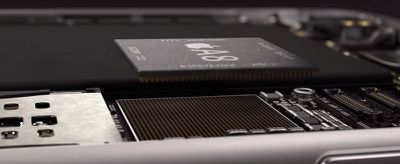Samsung and TSMC Begin Production of A9 Chips for 'iPhone 6s'
Apple manufacturing partners Samsung and TSMC have started volume production of A9 chips for the so-called "iPhone 6s," according to DigiTimes. The report claims Apple requested last-minute changes to the chip layout, requiring both chipmakers to rework wafers, but the modifications are not expected to impact the release schedule of the next-generation iPhone.

Apple's iPhone 6, iPhone 6 Plus and new iPod touch are powered by the A8 chip
TSMC will reportedly begin mass production of A9 chips based on a 16nm process in the fourth quarter of 2015, and is also expected to manufacture fingerprint sensors and audio chips on a contract basis for future iPhones. Conflicting reports have surfaced over the past several months suggesting that
Samsung,
TSMC or a
combination of the two would be responsible for A9 chip production.
DigiTimes has a mixed track record at reporting on Apple's upcoming plans, but it does have close connections with the overseas supply chain, and A9 chip production in July is reasonable with less than two months until the next iPhone is expected to launch. Apple will reportedly order a record-breaking 85-90 million "iPhone 6s" units from suppliers by the end of 2015.
The much-rumored "iPhone 6s" and "iPhone 6s Plus" are expected to be announced in September and could feature the same 4.7-inch and 5.5-inch screen sizes, an A9 processor with 2GB of RAM, Force Touch, a faster Qualcomm LTE chip, an improved 12-megapixel rear-facing camera and 7000 Series aluminum. The overall design of the smartphones will likely be nearly identical to the iPhone 6 and iPhone 6 Plus.
Popular Stories
Apple hasn't updated the AirPods Pro since 2022, and the earbuds are due for a refresh. We're counting on a new model this year, and we've seen several hints of new AirPods tucked away in Apple's code. Rumors suggest that Apple has some exciting new features planned that will make it worthwhile to upgrade to the latest model.
Subscribe to the MacRumors YouTube channel for more videos.
Heal...
In 2020, Apple added a digital car key feature to its Wallet app, allowing users to lock, unlock, and start a compatible vehicle with an iPhone or Apple Watch. The feature is currently offered by select automakers, including Audi, BMW, Hyundai, Kia, Genesis, Mercedes-Benz, Volvo, and a handful of others, and it is set to expand further.
During its WWDC 2025 keynote, Apple said that 13...
Popular accessory maker Anker this month launched two separate recalls for its power banks, some of which may be a fire risk.
The first recall affects Anker PowerCore 10000 Power Banks sold between June 1, 2016 and December 31, 2022 in the United States. Anker says that these power banks have a "potential issue" with the battery inside, which can lead to overheating, melting of plastic...
Chase this week announced a series of new perks for its premium Sapphire Reserve credit card, and one of them is for a pair of Apple services.
Specifically, the credit card now offers complimentary annual subscriptions to Apple TV+ and Apple Music, a value of up to $250 per year.
If you are already paying for Apple TV+ and/or Apple Music directly through Apple, those subscriptions will...
Apple's next-generation iPhone 17 Pro and iPhone 17 Pro Max are around three months away, and there are plenty of rumors about the devices.
Apple is expected to launch the iPhone 17, iPhone 17 Air, iPhone 17 Pro, and iPhone 17 Pro Max in September this year.
Below, we recap key changes rumored for the iPhone 17 Pro models:Aluminum frame: iPhone 17 Pro models are rumored to have an...
Apple is developing a MacBook with the A18 Pro chip, according to findings in backend code uncovered by MacRumors.
Earlier today, Apple analyst Ming-Chi Kuo reported that Apple is planning to launch a low-cost MacBook powered by an iPhone chip. The machine is expected to feature a 13-inch display, the A18 Pro chip, and color options that include silver, blue, pink, and yellow.
MacRumors...
Apple is planning to launch a low-cost MacBook powered by an iPhone chip, according to Apple analyst Ming-Chi Kuo.
In an article published on X, Kuo explained that the device will feature a 13-inch display and the A18 Pro chip, making it the first Mac powered by an iPhone chip. The A18 Pro chip debuted in the iPhone 16 Pro last year. To date, all Apple silicon Macs have contained M-series...
Apple last month announced the launch of CarPlay Ultra, the long-awaited next-generation version of its CarPlay software system for vehicles.
There was news this week about which automakers will and won't offer CarPlay Ultra, and we have provided an updated list below.
CarPlay Ultra is currently limited to newer Aston Martin vehicles in the U.S. and Canada. Fortunately, if you cannot...
Apple will finally deliver the Apple Watch Ultra 3 sometime this year, according to analyst Jeff Pu of GF Securities Hong Kong (via @jukanlosreve).
The analyst expects both the Apple Watch Series 11 and Apple Watch Ultra 3 to arrive this year (likely alongside the new iPhone 17 lineup, if previous launches are anything to go by), according to his latest product roadmap shared with...














 ('https://www.macrumors.com/2015/07/16/samsung-tsmc-begin-production-a9-chips-iphone-6s/')
('https://www.macrumors.com/2015/07/16/samsung-tsmc-begin-production-a9-chips-iphone-6s/')










